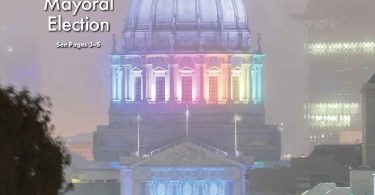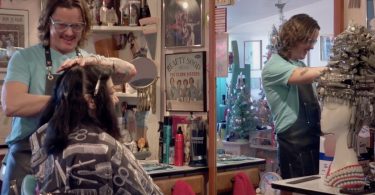By Ethan Rumrill
As president of the Santa Cruz County Deputy Sheriff’s Association, I am proud of the work that our members do to support and give back to the community we serve. Members of this association are frequently giving of their time and money for the benefit of others: schools, youth sports teams, community events, charities, etc.
We are an association made up of people who are invested in making the community a better and safer place to live, in part, because we are an association made up of people from the community. Our membership, while mostly active deputy sheriffs, boasts a broad cross-section of society to include members of the LGBTQ community.
This year, members of the Santa Cruz County Sheriff’s Office reached out to Pride with the intention of having a booth (complete with rainbow merchandise sporting the Santa Cruz County Sheriff’s Office badge) and having a volunteer group of uniformed personnel marching in the annual Santa Cruz Pride Parade, which is scheduled for June 2. What better way to show our support for this community, which historically is a haven for inclusion of all types of people? What better way for employees of the Sheriff’s Office, especially those who are among the LGBTQ community, to proudly wear their professional uniforms while also being proud of their personal identities?
Unfortunately, the Deputy Sheriffs Association recently learned that the board of Santa Cruz Pride has voted not to allow any uniformed law enforcement personnel to march in the parade, citing the fact that some members of the LGBTQ community have had negative experiences with law enforcement in the past. While they were quick to point out the fact that none of these negative experiences even involved members of the Sheriff’s Office, the board decided to exclude all uniformed law enforcement from participating.
To be sure, the history between law enforcement in the United States and the LGBTQ community has its roots in animosity. In fact, we understand that the Pride movement began in New York in the 1970s as a protest against police brutality perpetrated by cops against the LGBTQ community. Although much work is yet to be done to improve the ever-evolving profession of policing and some instances the departments’ relations with their communities, is it not safe to say that relations between the LGBTQ community and the law enforcement community have improved in the past half century?
How disappointing it is to see that, despite all the progress in relations over the years, Pride is unwilling to allow cops, even if those cops happen to identify as LGBTQ persons, to march in solidarity with their cause. For an organization that touts itself as inclusive, it is suddenly readily apparent that inclusivity is applied selectively by Pride.
I write this letter not in anger, but in disappointment that our association is being denied the opportunity to build stronger connections with our community, and by an organization that claims to want to do exactly that, no less!
I hope that these words will lead to some introspection among Pride members and supporters and generate a constructive public conversation about inclusivity and how this term, by definition, invites participation from people of all walks of life. Even cops.
In the meantime, the Santa Cruz Deputy Sheriffs Association will continue its partnership with, and participation in, the greater Santa Cruz community. Perhaps we will be able to see uniformed law enforcement personnel marching in the 50th anniversary Pride Parade next year in 2025. Perhaps not. Regardless, we stand ready to march when the time comes.
Ethan Rumrill is President of the Santa Cruz County Deputy Sheriffs Association.
More in Opinion







